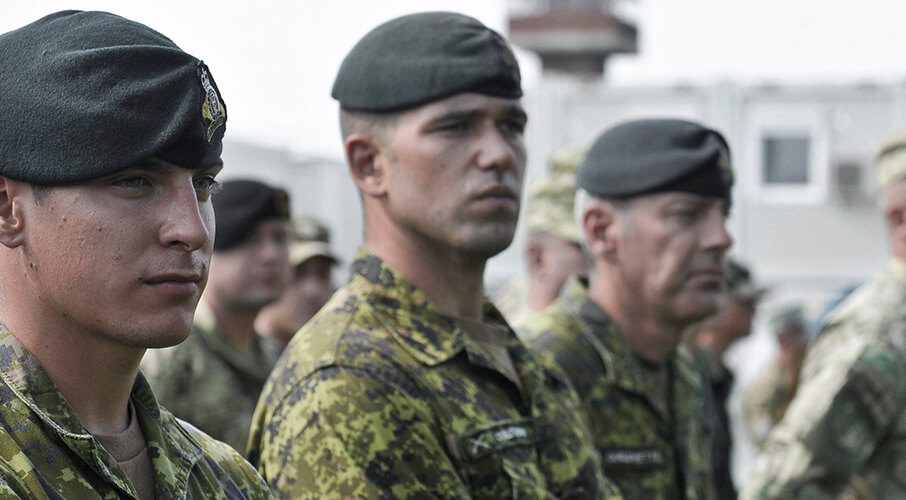
This article originally appeared in the Vancouver Sun.
By Richard Shimooka, April 20, 2022
On the eve of the federal budget a few weeks ago, federal NDP leader Jagmeet Singh said he believed that NATO’s member state defence spending benchmark of two per cent of GDP was an arbitrary figure that should not be adhered to. Although it is a rough number, it is a helpful metric. The reasons why require a bit of unpacking.
Canada currently spends around 1.36 per cent of its GDP on defence. The defence budget can be separated into three parts. The first is personnel: salaries paid to soldiers and civilian employees of the Department of National Defence. This is the most static part of the budget, and the size of the defence workforce tends to increase slowly.
The second segment of the budget is capital purchases: that is, the procurement of anything, from billion-dollar ships to thousand-dollar rifles.
What it does not include are “consumables,” which include fuel, spare parts and ammunition. These items form the third part of the budget: operations and maintenance. This part of Canada’s budget is relatively high compared to most NATO allies: Ottawa tends to commit our military more regularly than do other countries, and does more training. This is a double-edged sword because a more active and well-trained military will be more effective, but its equipment will require replacement earlier.
Military platforms have a service life lasting roughly 30 years for planes and ships, and 20 for armoured vehicles. Then they reach “rust out” — when they require urgent replacement. Using a platform after rust out means fielding often obsolete assets, like Canada’s 40-year-old CF-18 fighter jets. While not necessarily unsafe to operate, they require more maintenance to keep them going, resulting in much higher operating costs and less availability. Only 55 per cent of our CF-18s are “serviceable” — shorthand for being able to fly.
A rough rule of thumb for defence budgets is that capital purchases should be about 30 per cent of the budget. This ensures that equipment is replaced before reaching rust out. States with mature military-governance systems — like the United States, France and the United Kingdom — tend to meet that threshold. Canada’s capital purchases budget, for much of the 2010s, has only been around 10 per cent of defence spending, and only reached 14 per cent last year.
In 2017, the government promulgated the defence white paper — “Strong, Secure and Engaged” — which promised to ensure modernization of the armed forces’ equipment. However, a significant portion of the defence department’s allocated budget was not spent — nearly $10 billion, according to the Parliamentary Budget Office.
Chronic underfunding of capital purchases creates a “bow wave.” This is when deferred purchases start building up, which increases operational costs and eats away at the procurement budget. This bow wave has built up in Canada, and our present situation is reminiscent of the 2000s. Then, it was resolved through a number of major acquisitions during the 2000s and early 2010s — the most prominent being transport aircraft and armoured vehicles tied to operations in Afghanistan. But a number were removed without replacement.
Canada now has major gaps in some of its most essential defence capabilities. It has no air defence or modern artillery to enable operations in a conflict anywhere approaching the intensity of what we are witnessing in Ukraine today. This does not even take into account essential new technologies the armed forces require to work with our allies, such as in battlefield networking or unmanned combat vehicles.
The recent federal budget provides little relief. While it aims to increase defence spending to 1.5 per cent of GDP in five years, the added spending only addresses one area — NORAD renewal for Arctic security. The bow wave remains a serious issue.
The irony of Mr. Singh’s comments is that he stated that he wanted to make sure workers have “the right conditions to do their work” and noted “armed forces are asked to do tasks and work that they don’t have the equipment for.” Two per cent in this context is not close enough, given the bow wave of deferred procurements that has accrued in front of the Canadian Forces.
Naïveté surrounding how much it costs to field an effective military presents a threat to our troops, to our preparedness as a country, and to Canada’s strategic objectives. Canadian Armed Forces personnel are forced use outdated and inappropriate equipment. It’s a shameful situation that should be addressed.
Richard Shimooka is a senior fellow at the Macdonald-Laurier Institute.





